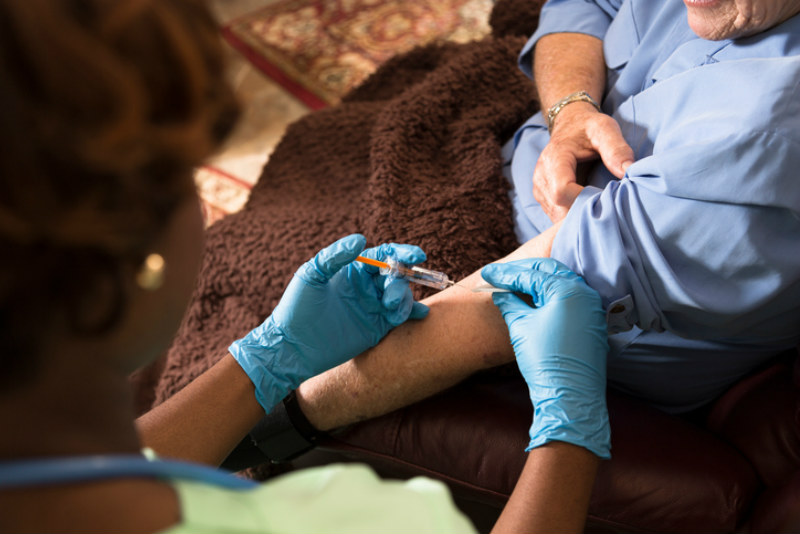The future of home healthcare: What doctors need to know
MDlinx Feb 17, 2022
For patients with acute health conditions, seeking care in a hospital during the COVID-19 pandemic may be inconvenient at best, and dangerous at worst. As a result, healthcare systems and hospitals are making strides in home healthcare (HHC) for qualifying patients.

HHC has proven to be a quality, cost-effective dimension of emerging value-based care systems—although it requires physicians to adjust how they practice, incorporating extra emphasis on social determinants of health (SDOH) and increased reliance on telehealth.
What is home healthcare?
Home healthcare (HHC), explained
HHC is a growing practice that provides care for patients in their homes. Instead of trekking to the hospital for medical attention and risking exposure to COVID-19, for example, patients who are stable enough to stay home receive acute-level care from HCPs via telehealth and home visits.
One example of HHC is hospital-at-home care. According to an article published by the American Hospital Association, hospital-at-home care allows care teams to safely and remotely monitor patients with conditions like diabetes, pneumonia, congestive heart failure, and others.
Patients can also access hospital services and treatments from home, including x-rays, echocardiograms, IV fluids and medications, and respiratory therapies through HHC.
The process looks like this: Once the care team establishes a treatment protocol with a qualifying patient, all medical supplies are delivered to the patient’s home. Doctors check in daily, adjust treatment plans accordingly, and formally discharge patients once they are well enough—an approach identical to in-hospital procedures, completely accessible from home.
While offering patients convenient care and reduced exposure to COVID-19, HHC may also necessitate slight modifications to how physicians practice.
Foreseeable changes for doctors
Seeing patients’ homes firsthand can offer clinical insights a doctor might not receive otherwise.
For one, doctors who spend more time treating patients in their homes have greater exposure to patients’ social determinants of health (SDOH), according to an article published by American Health and Drug Benefits. As a result, clinicians can expect to prioritize consideration of SDOH in treatment plans, as well as address any urgent unmet needs of patients.
Some patients may lack access to food or socialization, which could be missed during hospital stays. When doctors see patients’ living conditions, however, they can appropriately point patients toward social programs that can mitigate SDOH at the source.
Along with making frequent house calls, physicians will use telehealth services more often in HHC. As technology improves, doctors will be able to fulfill their tasks remotely when they aren’t traveling directly to patients’ homes, as mentioned by American Health and Drug Benefits. Such changes may minimize increases in downside risk arrangements as a result of embracing value-based care.
These adjustments to clinical practice may prove beneficial for financial outcomes as well.
Lower costs, higher quality of life
Another promising aspect of HHC is its potential to cut healthcare costs. One study published by the Annals of Internal Medicine looks at the differences in costs associated with acute care at home compared with acute care in-hospital.
In a randomized controlled trial, researchers documented the costs of 43 HHC patients and 48 control patients experiencing acute episodes. Overall, the mean budget for a HHC patient was 38% less than that of an in-hospital patient. HHC patients required fewer consultations, laboratory orders, and imaging studies than in-hospital patients, amounting to lower costs.
Additionally, HHC patients were readmitted less frequently within 30 days of the episode than control patients. Patients at home are also more active than their counterparts.
These benefits, however, are predicated on increased reliance on technological innovation.
Leading technologies in HHC
One driver of HHC is the development of information and communication technologies (ICT).
An article published by Informatics in Medicine Unlocked delves into the evolution of health monitoring systems, which enable regular communication between doctors and patients, routine consultations, and consistent measurements of vitals and other health parameters.
“Smart” health monitoring systems take ICT a step further. For example, patients who would normally need technological assistance can independently operate the latest software to control tablets, smartphones, and the internet—all while doctors monitor, diagnose, and treat patients remotely. These advancements mitigate hospital visits and improve patients’ mental health.
What this means for you
COVID-19 led to an increase in HHC, which offers medium-acuity patients the ability to receive quality, cost-effective care from their homes. Patients who receive this care maintain higher levels of physical activity, and see improved health outcomes. Healthcare trends predict that physicians, many of whom already embrace value-based care systems, will need to consider SDOH in treatment plans for at-home patients. The use of developing health technologies will also give physicians the opportunity to maximize remote work.
Sources
-
Ezugwu AE, Taiwo O. Smart healthcare support for remote patient monitoring during covid-19 quarantine. Informatics in Medicine Unlocked. 2020;20:100428.
-
Levine DM, Ouchi K, Blanchfield B, et al. Hospital-level care at home for acutely ill adults. Annals of Internal Medicine. 2020;172(2):77-85.
-
Value Initiative: Creating value by bringing hospital care home. American Hospital Association. 2020.
-
Vogenberg FR, Santilli J. Key trends in healthcare for 2020 and beyond. American Health & Drug Benefits. 2019;12(7):348.
-
Exclusive Write-ups & Webinars by KOLs
-
Daily Quiz by specialty
-
Paid Market Research Surveys
-
Case discussions, News & Journals' summaries